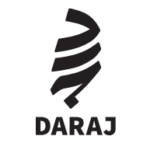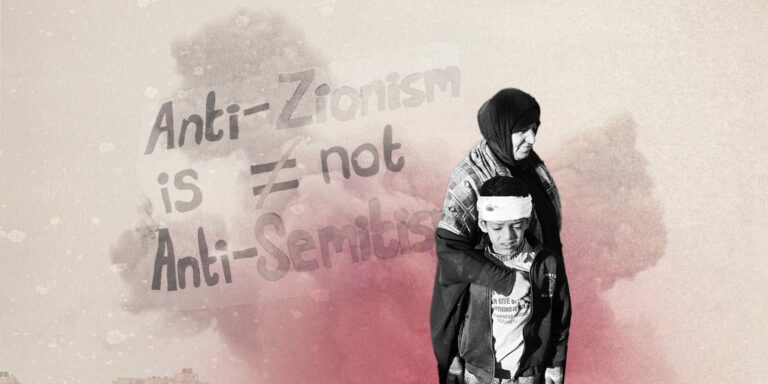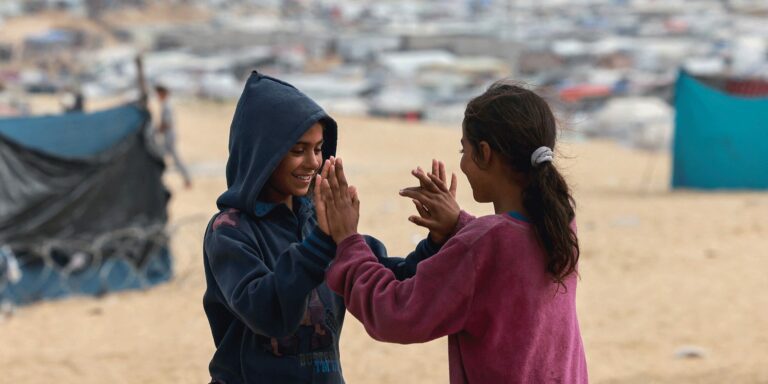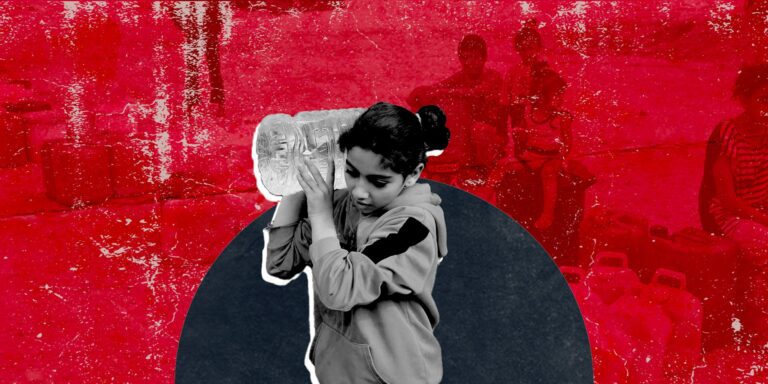Raw’a wants to leave Syria. But still she is hesitant. The 40-year-old woman has to abandon her dream, which began by entering the Department of Psychology at Damascus University and successfully passing the first semester exams. Then she has to decide to either work in a beauty salon in the Emirates or migrate to Germany with the help of smugglers and seek political asylum.
The decision to leave has been taken. Despite having a decent income as a nanny working for a prominent family in Damascus, she has grown tired of keeping pace with other people’s children. What’s more, she has started to feel that being away from her two teenage sons does not serve their future, which she strives to secure by all means.
In an interview with Daraj, Raw’a said that prospects in Damascus are bleak: “Everyone in distress is contemplating leaving. The shopkeeper, the baker, the taxi driver, my daughter’s teacher. Even the real estate brokers.”
While moving to the Emirates would only require contacting a friend in Abu Dhabi and purchasing a plane ticket, traveling to Europe would need some $10,000 to $15,000. She has managed to save part of the required sum and is trying to secure the rest with help from her relatives in Germany and by selling her house near the Yarmouk Camp for Palestinian refugees south of Damascus.
There are two ways for Raw’a to reach Europe. The first option involves being smuggled by gangs that operate between Syria and Europe. The second option involves Syrian regime officials who can facilitate her travel through legal channels. In both cases, Raw’a is required to pay a large sum of money.
Smuggling Routes
There are two smuggling routes. The first involves traveling by land through Turkey and Greece, followed by a journey on foot to Germany. Raw’a will need to pay smugglers some $10,000. The second route involves taking a flight from Damascus to Benghazi in Libya, and then embark on a boat journey to Italy, followed by a journey on foot to Germany.
Both routes entail great risks, including crossing forests and evading government forces and criminals. Raw’a has been preparing for these dangers for about two months.
When using Syrian regime officials, Raw’a has three options. The first is to obtain a visa to Romania through an employee at the Syrian embassy in Bucharest, who can arrange it for $10,000. Once there, the same official would assist her in secretly obtaining fingerprints from the Romanian authorities in a method he did not disclose. Afterwards, she can proceed to leave the country on her own to try to reach Germany.
The second option is to travel to Italy with a Schengen visa, which she would acquire through an employee at the Syrian Ministry of Foreign Affairs in Damascus. The cost of this is $15,000.
The third option is for Raw’a to wait for an employee in the Syrian Ministry of Higher Education to secure her a scholarship in Hungary, Slovakia, or Romania, which also requires a payment of $15,000.
Rawa’a main goal is to safely relocate her two sons from Syria to Europe to prevent them being conscripted in the Syrian army or being imprisoned. If such a situation were to occur, it would render her susceptible to blackmail by the secret services capitalizing on her desire to secure her children’s freedom.
“My children are my utmost priority,” she told Daraj. “I am more than willing to invest my money in transporting them to Germany, rather than using it to keep them protected in Syria.”
The Assad Clan
Anyone familiar with the hierarchy of corruption networks in Syria will understand that payments made by individuals to flee the country do not end up in the hands of one civil servant or smuggler alone. The ones low in the hierarchy will receive a part, yet most funds will go to those higher up in the pyramid, potentially reaching the top.
A report in the German Badische Zeitung, alleges that the Assad clan is financially profiting from human trafficking operations to Europe through Cham Wings Airlines (CWA). According to the newspaper, CWA charges $1,500 per person. Some of the victims aboard the ill-fated boat that sank off the Greek coast on June 14 reportedly flew CWA.
The Badische Zeitung also claimed that the Assad family, on behalf of international human smuggling networks, transports migrants to the Libyan city of Benghazi by CWA. CWA has been operating flights to Benghazi and Karachi (Pakistan) twice a week since the spring of 2022.
According to a report published in April by the English-language newspaper Malta Today, criminal groups operating at the airport demand a cash payment of €2,000 ($2,187) for a CWA ticket.
CWA was established in July 2007 as Syria’s first private airline by businessman Muhammad Essam Shammout. Analysts have linked CWA to Rami Makhlouf, a powerful Syrian businessman and cousin of Syrian president Bashar al-Assad. However, his wife Asma has greatly diminished Makhlouf’s influence and assumed control over most of his businesses and companies.
According to several media outlets, there were some 120 Syrian migrants aboard the boat that sank in Greece. Some 35 of them survived. Most Syrian migrants originated from the Daraa Governorate in southern Syria.
Following the tragic sinking of the migrants’ boat, both Pakistan and Greece declared a period of mourning. The Syrian regime has not issued any comment on the matter.
According to Syrian opposition writer Maher Sharafeddine, the sunken ship is a humanitarian catastrophe with a political dimension that has only intensified the tragedy.
“The Syrians on board were not on a leisure or fishing trip but were abandoned by the Assad regime and mostly expelled from southern Syria, leaving them no choice but to embark on a boat in search of a new homeland after being deprived of their own,” he said. “Their deaths were not due to natural causes but a result of forced displacement, which constitutes a political crime and massacre that can be added to the regime’s long list of atrocities.”
Daraa Settlement Arrangements
In recent weeks, the Syrian authorities in Daraa have been engaged in facilitating thousands of “taswyat” (settlements) in some 45 cities and villages in the Daraa Governorate. “Taswya” is a written request submitted to the security services by individuals wanted by the regime.
The applicants are interrogated and must agree not to act against the regime in any way. If the application is approved, the applicant will be issued a white settlement card, which features a photo, some personal data, and the signature of Major General Mahmoud al-Qawzi, head of the security and military committee in the Southern Region.
They are then given a time frame, ranging from one to six months, to settle their legal status either by joining the army or leaving the country. The current round of settlements is the third since the regime took control of Daraa in July 2018.
On June 5, Hussein al-Rifai, Secretary of the Daraa branch of the ruling Baath Party, stated that thousands of people in the Daraa Governorate wish to settle their status. This includes individuals who have evaded compulsory and reserve military service, deserters, and people wanted by the security services on other charges.
Al-Rifai estimated that the number of daily settlement requests ranged between 1,300 and 2,000. He anticipated that the total number of individuals wishing to settle their situation in the governorate exceeded 13,000, as the settlements are believed to enhance security, safety and stability in the region.
The Daraa Governorate has been subject to stifling security restrictions. There are numerous military and security checkpoints, and thousands of residents are on the regime’s wanted lists. The settlements allow wanted people to leave the country.
An intelligence source in Daraa confirmed that the settlement process is closely monitored, while directives have been issued for all military and security checkpoints to facilitate procedures for individuals wishing to settle their situation.
The source affirmed that anyone who has settled their status in terms of military service will have their name removed from the security lists and, like any other citizen, will be entitled to obtain all necessary documents and personal papers.
Local sources told Daraj that settlement requests are submitted at the Qasr al-Houriat Tourist Complex in Daraa. These requests are accompanied by a bribe of 100,000 Syrian Pounds ($15.30), equivalent to the current monthly salary of a Syrian civil servant.
Sharafeddine argues that the settlement process is part of an Iranian plan with two objectives. The first is to subjugate Daraa Governorate, while the ultimate aim is to induce a demographic change in the region.
In an interview with Daraj, Sharafeddine explained that Iran wants southern Syria to be vulnerable and weak, one that lacks young people, to facilitate its control over the area.
He also said southern Syria has become a tool for Iran to manipulate Arab states through blackmail. This is particularly concerning due to the transformation of the southern region into a large-scale drug production center and smuggling corridor for narcotics by Lebanon’s Hezbollah.






